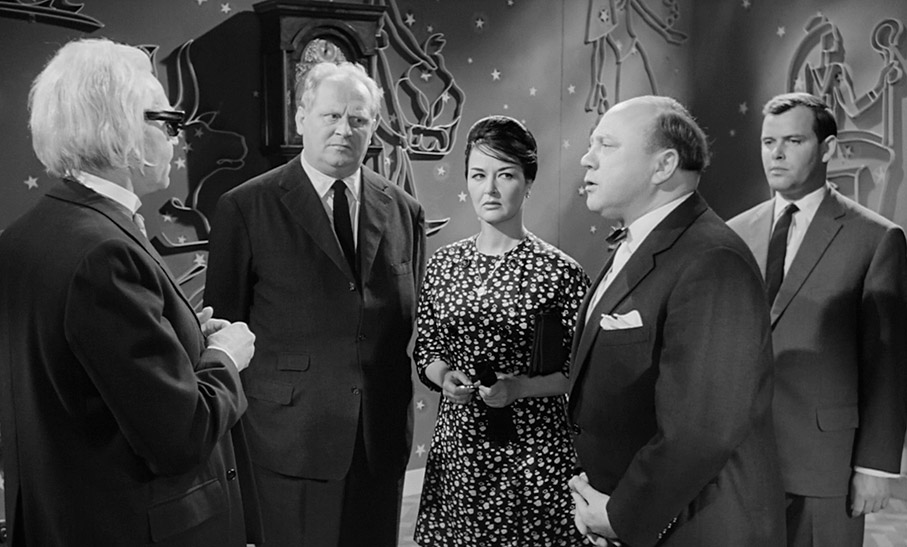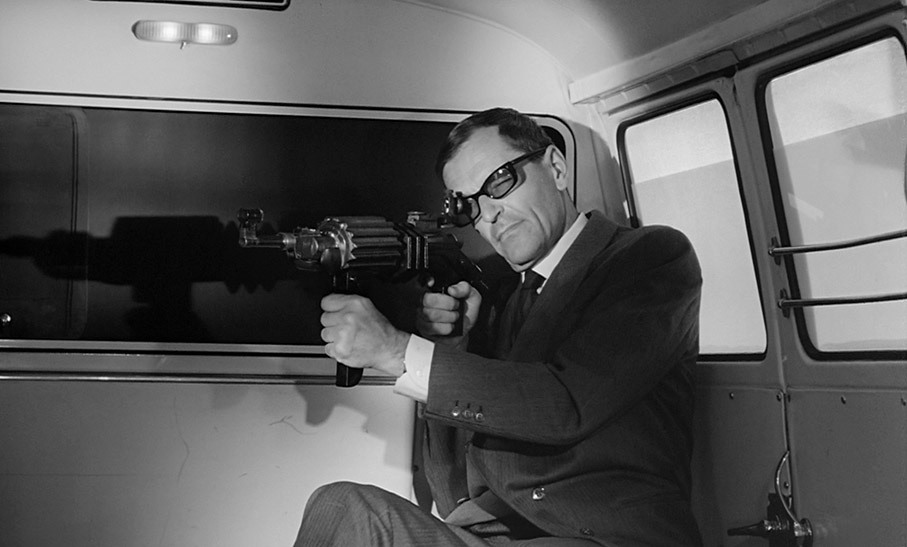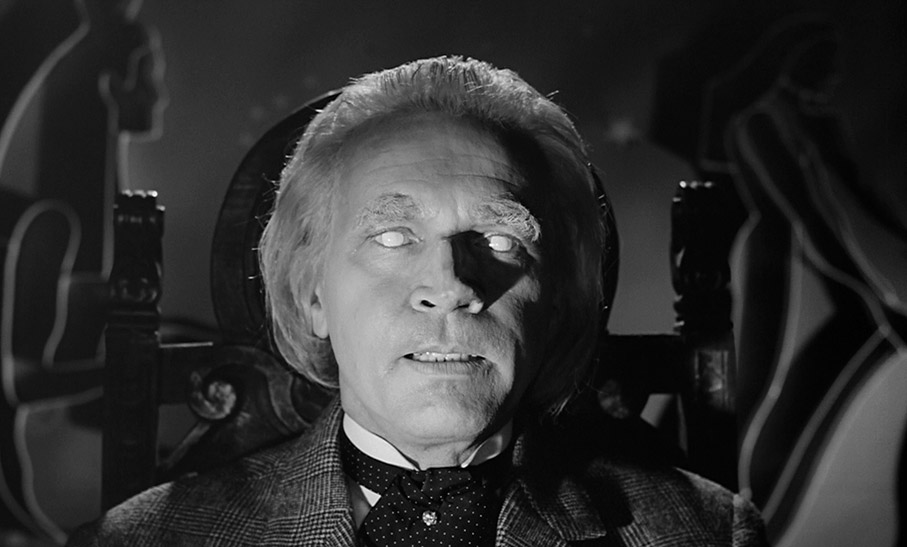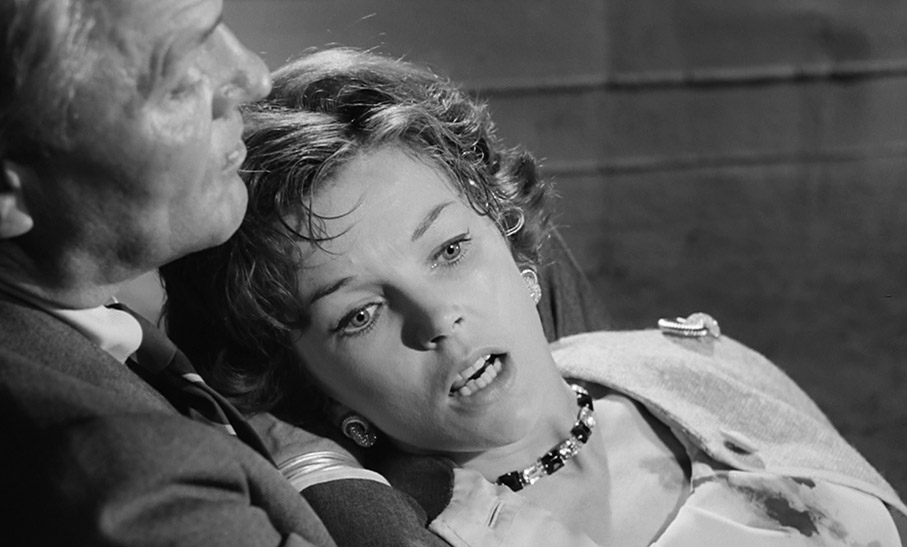|
The 1,000 Eyes of Dr. Mabuse [1000 Augens des Mabuse] was the third film in Fritz Lang’s rightly celebrated Mabuse trilogy, arriving belatedly in 1960, 27 years after the release of the second film. If the name Dr. Mabuse is new to you, then you’ve probably come to the wrong film and would do well to hunt out this film’s predecessors, Dr. Mabuse, der Spieler [Dr. Mabuse, the Gambler] (1922) and Das Testament des Dr. Mabuse [The Testament of Dr. Mabuse] (1933) first. Both are crime cinema masterpieces, and watching them will not only give you a solid grounding in just how powerful and dangerous a criminal the titular Dr. Mabuse is, but will also deliver a richly entertaining and artistically thrilling build-up to the events that play out here. On top of that, it will prevent you from learning about a crucial plot point from the earlier films that I can’t really avoid giving a mention here. Thus, if you’ve never seen the first two films and plan to do so before watching this one (and you really, really should, as both are available on Masters of Cinema Blu-rays), then stop reading now and come back when you’ve done so. Of course, it could be argued that as long as you know that Mabuse was a powerful criminal mastermind, then you could theoretically follow this film without watching its predecessors, but seriously, why would you? I also have a feeling that nothing I said by way of an introduction could come close to conveying the threat Mabuse represents or the reach of his criminal empire anything like as well as the films themselves do.
Assuming you’ve just watched or re-watched the first two films in preparation, then the opening scenes of The 1,000 Eyes of Dr. Mabuse may well come as a bit of a jolt, with the wider aspect ratio, brighter imagery and jazzier main theme starkly differentiating this film from its visually and thematically darker predecessors. There's also no sign of Mabuse himself, who early in the film is confirmed dead when his criminal empire is outlined in a boardroom meeting conducted under a dense smog of cigarette smoke. There’s thus no question that in this film we’re dealing with Mabuse’s legacy rather than the man himself, and however impressive his successors may be, there really is only one Dr. Mabuse.

As with Das Testament des Dr. Mabuse, the question of just who has stepped into Mabuse's shoes is initially unclear and remains so for a sizeable portion of the film, though there are certainly plenty of potential suspects. There's wealthy American businessman Henry Travers (Peter van Eyck), who’s in town to buy the Taran nuclear works and who talks a woman named Marion Menil (Dawn Addams) out of a suicide bid when she chooses the ledge outside his hotel room to jump from. There's cheery and improbably named insurance salesman Hieronymus B. Mistelzweig (Werner Peters), who seems to be on the level but is prone to sudden stern glances at others when their backs are turned. And what about Marion's psychiatrist, Professor Jordan (Wolfgang Preiss), whose arrival to help Marion with her distress can’t help but feel a little too perfectly timed? Then there's hotel detective Berg (Andrea Checchi), whom we probably wouldn't be considering at all were he not in a position of authority at the Luxor Hotel, which by the time we meet him has already been confirmed as a potential hub for criminal activity. You might also have cause to wonder about the carefully undisclosed identity of the club-footed individual who's keeping a close watch on the guests using a hidden closed-circuit TV system.
And what of blind, white-haired clairvoyant Peter Cornelius? He's not staying at the hotel but has an uncanny way with crime prediction. We get to meet him when he calls sceptical police commissioner Kras (played by the splendid Gert Frobe and a direct replacement for the previous film's Inspector Lohmann, to whom he bears more than a passing physical resemblance) after one of his visions predicts what he fears may be murder. The sceptical Kras is initially dismissive, but when TV reporter Peter Barter is found dead in his car at the stated location, he starts to take notice. A heart attack is initially diagnosed but we know better, having witnessed his assassination from a nearby car at the start of the film. Further investigation reveals that he was killed by a needle fired into his brain from a powerful air gun, the blueprints for which were stolen from the American government and found in the post-mortem search of Barter's flat. A link is made to a number of murdered industrialists – care to guess which hotel they all stayed at when in town? As Travers tries to get to the root of Marion's suicide bid and Mistelzweig alternates between cheery introductions and suspicious glares, Kras rolls up at the hotel to start making enquiries of his own, unaware that he's not the only one there conducting an investigation.

Despite the opening murder – which with a few small changes is effectively a rerun of a similar scene from Das Testament des Dr. Mabuse – The 1,000 Eyes of Dr. Mabuse feels lighter in tone than its predecessors, though this has more to do with its look and feel than its content. The decade in which is was made is visually reflected in its camerawork, lighting, set design and costumes, while the spectacled assassin who kills Barter is very much a man of his time and would not have looked out of place a few years later in the likes of The Killers, Bullitt or Point Blank. But there's still enough intrigue and story complexity for the film to sit comfortably alongside its predecessors, and in terms of their role in the narrative, almost no-one here is quite who they appear to be and there's plenty of effective misdirection to keep you guessing.
1000 Augens des Mabuse is, perhaps inevitably, the least innovative of Lang's three Mabuse films, but it's still an engrossing, complex and forward-looking crime thriller with its share of surprises and memorable scenes. The early in-car assassination may be recycled from Testament (the bombing of Kras's office is also a revamp of a key scene from Dr. Mabuse, der Spieler), but it's still a smartly staged and tone-defining set-piece, while Lang's use of cross-cutting, mid-sentence scene switches and associative sound is as rewarding as ever. The title also hints at a subtext whose potency has actually increased with the passing of time, as the hotel guests are voyeuristically observed on a closed-circuit television system by unseen eyes, while a two-way mirror offers one of the watched the opportunity for some role reversal, a suggestion he is initially outraged by but is unable to resist. In the age of Big Brother and its ilk and a society that currently has the third largest number of CCTV cameras per capita in the world after the United States and China, this can't help but feel like Cornelius's most accurate prophecy of things to come.
No details have been provided about the source of the 1080p, 1.66:1 transfer here, but it’s a belter. Detail is sharply rendered, dust spots are all but gone and the monochrome image has a lovely tonal range, with solid blacks, no hint of burn-out on highlights. Comparing it directly with the previous Eureka DVD shows just how good this new HD version is, having a richer feel and a more subtly graded contrast range. What really stands out, as you would hope, is the considerably increased level of picture detail, which is handsomely illustrated by the wide exterior crowed scene that opens chapter 4 – on the DVD the faces and specifics of clothing are lost in a blur, but on the Blu-ray they are far more clearly defined. A fine film grain is also visible. A handsome job.

The Linear PCM mono 2.0 soundtrack is available – as it was on the DVD – in both English and German language versions. Unlike the DVD, however, the German and English tracks are sonically of a similar standard, with the same unsurprising range restrictions but no damage or background hiss on either, and the dialogue is always clear. As David Kalat points out in the commentary, the international cast means that both tracks are actually dubs, but as a sizeable portion of the cast are German speakers, the German track the most authentic. That said, the English dub is better matched to movements of the actors’ mouths than a good many I could name.
From the main menu you can elect to play the German language version of the film with or without English subtitles, or choose the English language version, where subtitles will only appear to translate on-screen text.
Commentary
Film historian and author David Kalat takes us through the film and its production and offers some intriguing readings of its themes and motifs. A wealth of background detail is provided, with information on the careers of the key actors, the multinational cast and the use of dubbing, the proposed but unrealised dual-language shoot, and lots more. There’s also an off-topic story about Goldfinger that leads on to Kalat defending previously expressed views on actor Gert Frobe and his wartime connections with the Nazi party. A sizeable chunk of the second half of the commentary is taken up by three possible explanations for Lang's return to Mabuse after such a long break, all of them well worth a listen.
Alternate Ending (1:05)
An ending that appeared only on French prints of the film – the change is small in terms of screen time, but enormously significant to the conclusion.
Wolfgang Preiss Interview (15:11)
An interview conducted with Wolfgang Preiss, an actor who became so associated with the later Mabuse films that he was even included in the promotional material for one that he was not actually in. Conducted in November of 2002, just weeks before Preiss passed away, it's both important as a cultural document and a consistently engaging chat, particularly in his memories of his early career, of landing a role in this film, of Lang's directing style and of working outside of Germany – asked about being offered the role of a Nazi officer in The Train and Von Ryan's Express, he responds that you just can't say no when Burt Lancaster or Frank Sinatra is in the lead.

Booklet
This typically fine booklet has been updated from the one that accompanied Eureka’s Mabuse DVD box set to include a new and engrossing essay by Philip Kemp that details how the film came about before making a persuasive case for its qualities. This is followed by a brief piece on Fritz Lang's chimpanzee Peter (yes, you read that right) by David Cairns, and a scrapbook of Lang's comments on the film, contemporary cinema and working with Jean-Luc Godard on Les Mepris. Finally, we have an extract from Lotte Eisner's book on Lang that discusses some of his unrealised projects. The booklet is illustrated with production stills and posters, including an interesting Japanese one. As ever, the main credits for the film have also been included.
Originally released on DVD in the UK only as part of Eureka’s 2009 The Complete Fritz Lang Mabuse Box Set, this is the last of the three films to receive a stand-alone Blu-ray upgrade. If you’re a fan of the first two films and didn’t get around to buying the box set or are looking to upgrade to an HD version, then this is for you, and while the special features are almost exactly the same as those on the DVD, the picture upgrade is significant. It may be the lesser of the three films, but it’s still Lang, it’s still Mabuse and it’s still damned fine crime thriller entertainment. Recommended.
|